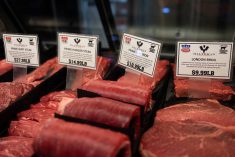With the effects of BSE and drought hitting many Manitoba farm families this winter, it can be hard to stay cheerful.
But farm women who attended the 2003 Manitoba Farm Women’s Conference spent two days finding ways to stay positive even when everything and everyone seems depressed.
For farm women, remaining upbeat is an important duty.
“The farm wife often has to keep everyone else positive,” said Barbara Edbom, a conference organizer who lives on a farm in the Piney area.
“But that’s hard when you feel run-down. As a farm wife you’re often the gopher. You go-fer this, you go-fer that and you never take time for yourself.
Read Also

India slaps 30 per cent import duty on yellow peas
India has imposed a 30 per cent duty on yellow pea imports with a bill of lading date on or after Nov. 1, 2025.
“This conference is a time we’re taking for ourselves and reaching within ourselves to stay positive.”
Farm women at the conference heard presentations by mental health specialists, psychologists and humourists about how to live a fulfilling life on the farm.
In the same boat
Pam Pugh, a farm woman from Portage la Prairie, said conferences like this are important because they let farm women realize that everyone is dealing with stress.
Even if today’s farm problems aren’t directly hurting someone’s farm, the effect on neighbours can cause as much stress.
And problems down the road can quickly come calling .
“We don’t have cattle, but we need the cattle producers to buy our barley,” said Pugh. “Cattle producers depend on us, and we depend on them. When it’s bad times for them, it’s bad times for us.”
Edbom said most farm women believe a positive attitude can carry a family through a bad time. That’s how she and her husband dealt with the sudden closing of the American border to Canadian cattle.
The week of May 20 they intended to ship their backgrounded calves to a Nebraska feedlot.
All of a sudden they were stuck with 50 hungry calves they had wanted to say goodbye to.
So they kept feeding them and started figuring out a way to get some of their money back. They arranged for slaughter at a couple of local abattoirs and meat cutting at another plant, and started calling friends and family in Winnipeg, who spoke to their friends and relatives. Soon they had orders for all the meat and got rid of the feeders faster than they expected.
“It was fun and it was interesting,” laughed Edbom about her foray into direct marketing to consumers.
“You had to look at it that way or you’d be scared.”















